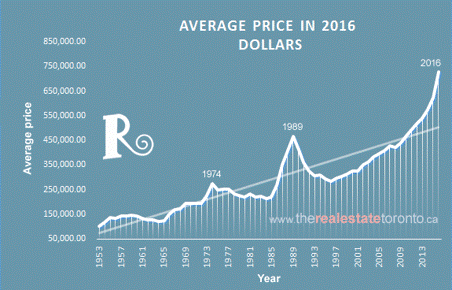The Bank Of Canada Should Resist Rate Increases
Recently, there have been calls for the Bank of Canada (BoC) to shift gears towards tightening monetary policy in response to inflation in the housing. Nevertheless, when it meets on May 24th, the BoC should resist the pressure to raise the overnight bank rate, currently set 0.5%.
The central bank has kept its policy rate low in an effort to stimulate an economy that has been struggling since the onset of the global financial crisis. The struggle became more acute when oil prices collapsed in 2014 and continue to languish at more than 50% below pre-2014 prices. With the collapse of oil prices, the BoC actually lowered the bank rate twice to shore up the economy.
All the while, house prices have more than doubled since 2009 in the two biggest markets, Toronto (Figure 1) and Vancouver. In response to the rapid rise in the cost of home ownership, the household debt-to-income ratio has risen to a record high 167 per cent. This surge in debt has led some international economic agencies to issue warnings regarding the sustainability of the housing market. Major Canadian business media are starting to speculate on what would happen to the economy should housing prices collapse suddenly.
Figure 1 Housing Price Trends in Toronto (C$)

Earlier indications are that the Canadian economy grew rapidly---possibly as fast 4% annualized—in the first quarter of 2017. Some economists are arguing that it is time to remove the “artificial” stimulus of recent rate cuts. David Rosenberg, chief economist at Gluskin Sheff & Associates, argues “it time for the Bank of Canada to at least signal their intent to take back the two emergency rate cuts in response to the energy meltdown.”
The question is whether raising the bank rate is the appropriate response to these current conditions. The BoC should resist these pressures for several reasons:
- It would be wrong to use a blunt instrument, such as rate hike, to deal with a specific localized issue like housing costs in Toronto and Vancouver; these cities suffer from shortages of developing land at a time when demographic pressures are driving demand for housing, not speculation;rate hikes do nothing to alleviate these underlying conditions;
- Raising rates will affect all segments of the economy, many of which are not incurring inflationary pressures and do not warrant an increase in the cost of capital;
- Nominal wages in Canada are barely moving upwards, while real wages have actually fallen slightly over the past couple of years; this indicates that there are no real inflationary pressures coming from the labor market;
- Business fixed investment has been declining for the past five years and has been a drag on economic growth;
- The BoC has maintained that there continues to be a significant output gap ( i.e. unused capacity)that needs to be closed before monetary conditions should be tightened; and, lastly,
- NAFTA negotiations are about to get underway; now is not the time to tighten borrowing conditions during a period of considerable uncertainty.
While the BoC is not likely to raise the bank rate next week, it will be very revealing to learn more about how the central bank interprets these economic developments going forward.
Disclosure: None.



